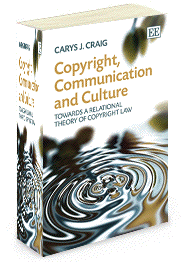What does the publisher say? According to the web-blurb:
"In this provocative book [This is a given: as readers of this blog will know, there is no obscure nook or cranny of contemporary copyright law and practice that is so bland and inoffensive that it will fail to provoke anyone at all], Carys Craig challenges the assumptions of possessive individualism embedded in modern day copyright law, arguing that the dominant conception of copyright as private property fails to adequately reflect the realities of cultural creativity [though it does adequately reflect the realities of the human urge to retain control, if not absolute ownership, of (i) the fruit of one's labour and (ii) anything one has paid for. Can we choose our realities?].This is a fascinating read, and a slow one for anyone who takes time to absorb the impact of abstract nouns and their full import. For various readers -- including those who love raw, undiluted Locke and those who felt that Lior Zemer's re-imagination of him in The Idea of Authorship in Copyright (Ashgate 2007) hit their intellectual sweet spot -- this book will be a bit of a bumpy ride. For those who see virtue in the creative tensions which exist in current copyright norms, it is even bumpier. Buy it for a friend you enjoy discussing copyright with, read it together and you'll never be bored.
Employing both theoretical argument and doctrinal analysis, including the novel use of feminist theory, the author explores how the assumptions of modern copyright result in law that frequently restricts the kinds of expressive activities it ought to encourage [This is a tricky proposition, with that great big 'ought' in the middle of it. And is there a serious criticism that the same assumptions result in the encouragement of expressive activities which ought to be restricted -- or is that too sensitive a point?]. In contrast, Carys Craig proposes a relational theory of copyright based on a dialogic account of authorship, and guided by the public interest in a vibrant, participatory culture. Through a critical examination of the doctrines of originality and fair dealing, as well as the relationship between copyright and freedom of expression, she explores how this relational theory of copyright law could further the public purposes of the copyright system and the social values it embodies.
This unique and insightful study will be of great interest to students and scholars of intellectual property law, communications, cultural studies, feminist theory and the arts and humanities [Funnily enough, the publishers -- who almost routinely say their books will be useful to practitioners -- don't say so here. There is actually some significant discussion of case law, by the author and by those whom she cites, from which policy-oriented lawyers and judges can benefit]".
Bibliographical data: publisher: Edward Elgar Publishing, 2011. viii + 265 pages, hardback. ISBN 978 1 84844 839 1. Price £65 (online, direct from the publisher, £58.50). Book's web page here.

I offered to review this for Edward Elgar Publishing on the 25th July, but I've not received my copy yet.
ReplyDeleteIf I don't receive a copy, I'll take it that I'm judged unlikely to give it a helpful review - or that my audience is judged to be minuscule.
I've posted my review/critique here: Review: Copyright, Communication and Culture by Carys J. Craig.
ReplyDelete